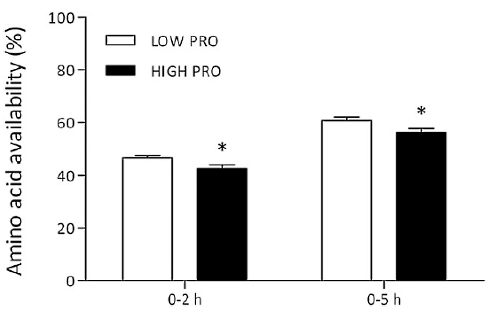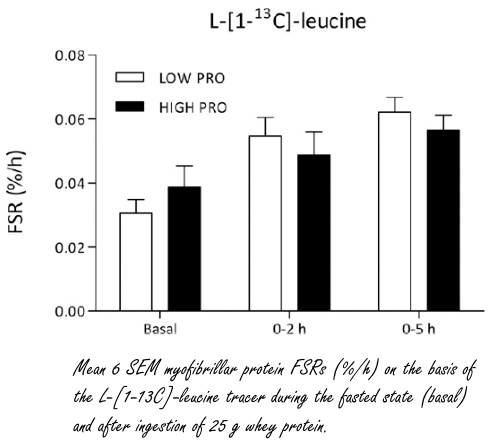|
High-protein diet does not make your whey shake less anabolic
If you are consume a high-protein diet, your body deals with the amino acids in those proteins less efficiently than if you consume few proteins. But this has no negative consequences for the anabolic stimulus of a whey protein shake, according to a Dutch study from 2017. We, the ignorant compilers of this free web magazine, see the study as an indication that strength athletes who are already high in their proteins will still benefit from a whey shake before or after their workouts.
Study
Nutritional scientist from Maastricht divided 24 men aged 55-75 into 2 groups. They gave one group during 14 days a diet that delivered 0.7 grams of protein per kilogram of body weight. [Low Pro] Another group received a diet for 14 days that delivered 1.5 grams of protein per kg of body weight. [High Pro]
At the end of this period, the men got a shake with 25 grams of whey. Some amino acids in that shake were labeled, and this enabled the researchers to determine what happened to the amino acids in the whey in the body.
Results
After ingesting the shake, the researchers saw slightly less amino acids appear in the bloodstream of the men in the High Pro group than in the men in the Low Pro group. And yes, the difference was statistically significant.


The efficiency with which the body deals with amino acids diminishes as the amount of protein in the diet increases. However, this effect has no consequences for the synthesis of muscle proteins after whey consumption.
Conclusion
"In conclusion, habituation to a low protein intake (0.7 g/kg/d) compared with to a high protein intake (1.5 g/kg/d) increases the postprandial release of dietary protein derived amino acids into the circulation with no subsequent changes in postabsorptive muscle protein synthesis rates or postprandial muscle protein synthesis rates after ingestion of 25 g protein", the researchers write.
Source:
Am J Clin Nutr 2017;105:332-42.
More:
Women with Physique aspirations benefit from a high protein diet (19.04.2018)
Do you want to build more muscle? This is the optimal protein intake (23.02.2018)
This is how much protein strength athletes need on their non-training days (26.06.2017)
Archives:
Protein
|
|